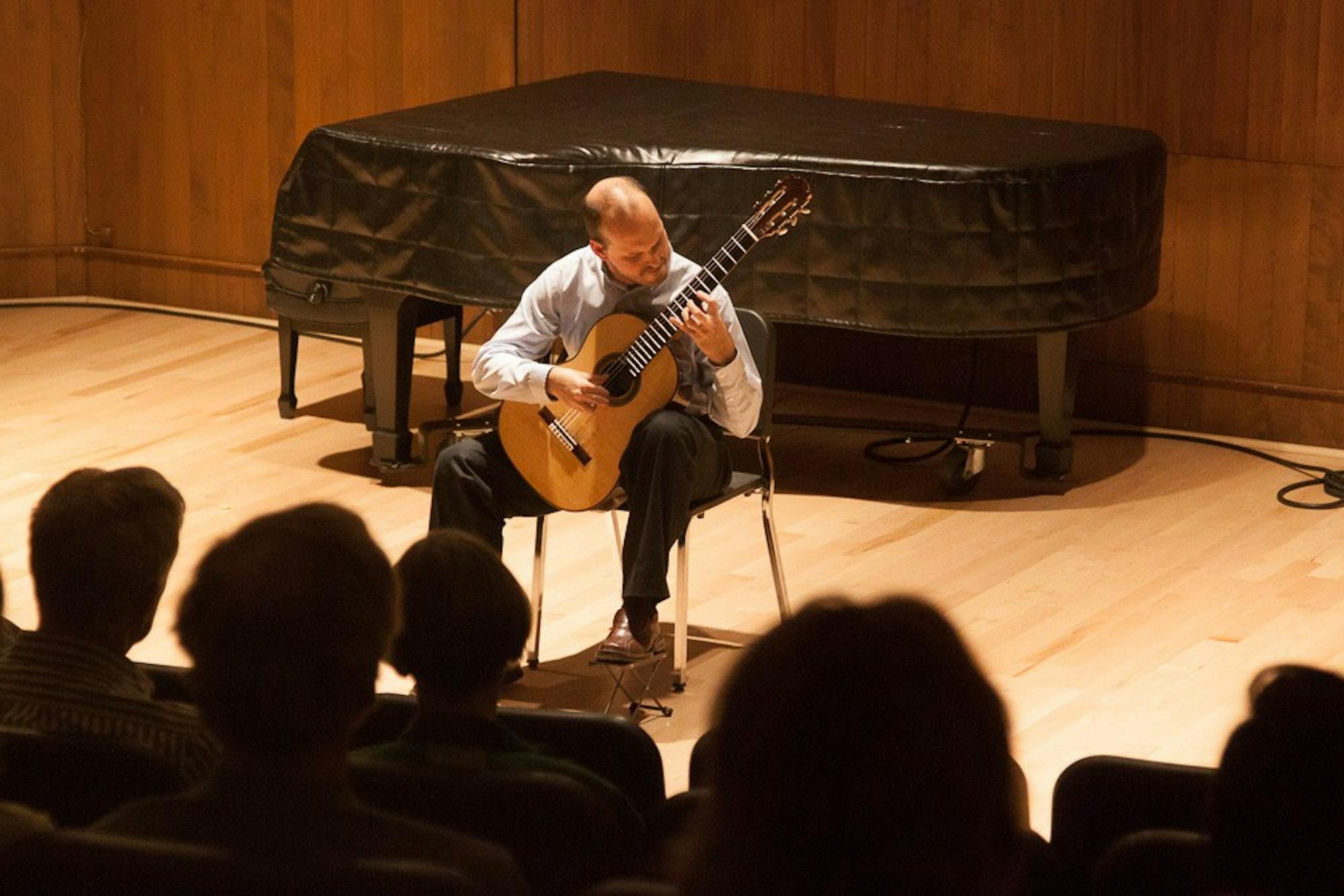The stage was dimly lit, bare except for Hermann Hudde, in all black, and his guitar. The intimate, minimalist setting shone a spotlight on Hudde’s talent, inviting the audience to fully immerse themselves in his music.
Hudde, a classical guitarist, performed in the Faulkner Recital Hall at the Hopkins Center on Sunday as part of the Vaughan Recital Series.
Last night, in Hudde’s third time performing in the Vaughan Series, he played music by composers Rodrigo Riera, Leo Brouwer, Agustín Barrios Mangoré, Antonio Lauro and Manuel M. Ponce. He enjoys playing in Faulkner, he said, because of its “fantastic acoustics” and “open and receptive” audience.
Hudde played a full set, divided into parts by musician, with a brief intermission. After each artist, Hudde explained his experience with the compositions and opened it up to the audience for dialogue. The music in the first half of the show had an upbeat tone that was palpably different from the slower, more somber mood of the second. The performance followed a natural progression, telling a cohesive story that audience members could feel wholly part of.
Alan Rozycki ’61 Med’63, an emeritus professor of pediatrics at the Geisel School of Medicine, said he has attended the Vaughan shows for many years and called the series a “wonderful offering to the community.”
“I particularly like classical guitar, and thought [Hudde] was an engaging performer,” Rozycki said. “I thought this was a very good show — it was a nice, relaxing evening overall, which is exactly what I came here for.”
Arts and sciences department administrator Catherine LaTouche said that the music department considers all types of music to feature in the recitals, from folk to jazz to contemporary. However, most of the requests to participate in the series come from classical musicians, she said.
Hudde, originally from Venezuela, is no different. But he admits that his path was far from typical.
Hudde grew up playing the electric guitar because he loved classic rock, especially Queen. He later switched to playing jazz-fusion, a combination of jazz and rock music. Hudde learned classical guitar in college and finally “found his place,” he said.
“I am in the minority,” Hudde said. “Usually musicians begin playing rock music after being trained in classical, but I was the other way around.”
John Muratore, senior lecturer in classical guitar, described the classical guitar as a “very intimate” instrument in both its sound and in its overall presentation. The musician holds the guitar close to his body, using only his fingers to produce the sound. The classical guitar is also very versatile, as its unique “adaptability” to many musical genres allows its repertoire to be extremely varied, he said.
“Classical guitar, when played well, can carry all the elements of a composition on its own, providing melody, harmony, multi-voiced textures, intricate rhythms, dynamics, varied articulation and widely-varied tone colors,” Muratore said.
Hudde echoed Muratore’s sentiment, calling the classical guitar an “expressive instrument” capable of developing “many different kinds of sonorities.”
Hudde traveled to Europe for eight years after college in order to pursue music. He later settled in the U.S., earning a Master of Arts in Musicology from Brandeis University, as well as a Master of Music degree from the New England Conservatory in Boston.
Hudde concentrates on Latin American art music and has published several articles and reviews. He also designed and taught a course titled “Latin American Classical Traditions” at the New England Conservatory School of Continuing Education. While Hudde seeks to further explore the academic side of music and plans to apply for a Ph.D. and write a book, he said he always wants to continue his true passion — performing.
The series is named for Alden G. Vaughan, a member of the Class of 1917 who died in 1984 and who made a bequest to the College in support of the fine arts, according to LaTouche.
Music department administrative assistant Samantha Candon said that the Vaughan concerts, which are free to the public, try to create a flexible, relaxed environment.
Candon said that the series attracts musicians from different backgrounds and disciplines. It has hosted prominent jazz guitarist Gene Bertoncini, flutist Albert Brouwer and pianist-in-residence Sally Pinkas. Classics professor James Tatum ’99 has also played a piano recital in the series.
Amanda Roberts ’16, who attended Sunday’s performance, said she was surprised by how much she enjoyed watching classical music.
“I’ve never been to a professional music concert on campus before, but I really enjoyed seeing [Hudde] today,” she said. “I definitely want to start coming to more shows, and think more students should too.”
Hudde said that all students, regardless of their interests, should watch live music. College, he said, should go beyond classroom learning, and be more about life experience and trying new things. He described the arts as “powerful” and “life-nurturing,” and said he seeks to empower people through his music.
“[Dartmouth] students are very lucky to have access to the arts,” Hudde said. “In other parts of the world, students don’t have the same resources, so they should take advantage of these opportunities.”




